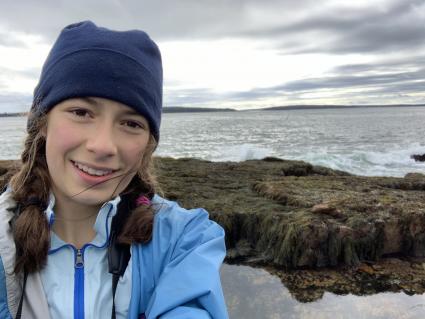Youth activist asks Grand Marais and Cook County to declare climate emergency
On a day when sub-zero temperatures blanketed Cook County, WTIP aired an interview Jan. 25 with local youth climate activist Olya Wright.
Wright is 16 years old and lives near Grand Marais. In 2014, she started the Nordic Nature Group in Cook County. Among its notable accomplishments, the group of local youth activists partnered with iMatter and Grand Marais city officials to pass a youth climate inheritance resolution.
More recently, Wright sent a request to the Cook County community and beyond requesting that people sign a petition declaring a local climate emergency. The Grand Marais City Council will consider a resolution on this topic during its meeting Jan. 26.
In the process of bringing awareness to the petition, Wright shared information with the public about the COVID-19 pandemic and how it impacted the Nordic Nature Group and her individual ability to raise awareness on things specific to climate change, activism and engagement in the global crisis.
“Despite the pandemic, it’s important to keep working on addressing climate change,” Wright said.
The mere mention of climate change on a day the morning temperature for most of Cook County hovered in the 20 below zero range potentially set the table for skepticism concerning the notion of ‘global warming.’
As it was explained during previous WTIP interviews, including those with scientists and researchers from Minnesota Sea Grant and the University of Minnesota Duluth, understanding the difference between climate and weather is a necessary distinction during brutally cold and extremely hot days in Cook County.
Thomas Beery studies climate change at Kristianstad University in Sweden. He previously worked at UMD studying climate on the North Shore and told WTIP in 2019 that weather is what people see outside on any particular day. Climate, meanwhile, is the average of that weather. Learn more about this concept here.
Despite occasional cold snaps during the winter, Minnesota has gotten noticeably warmer, especially over the last few decades, according to the state department of health and the Minnesota Department of Natural Resources.
During her recent interview with WTIP, Wright recalled the extreme heat and drought from the summer of 2021. She also mentions the complete closure of the Boundary Waters Canoe Area Wilderness last summer as another example of how climate impacts are being felt on the local level.
“A summer filled with drought and raging fires reminded me of our humanitarian crisis and our need for action,” she said. “I realize that during this pandemic I am not alone in losing motivation, but also that now is our chance to build again and build back stronger and wiser, too.”
Listen to the audio below to hear the full interview with Wright and WTIP’s Joe Friedrichs.
Tweet







